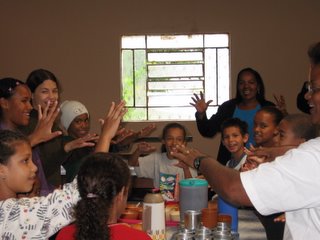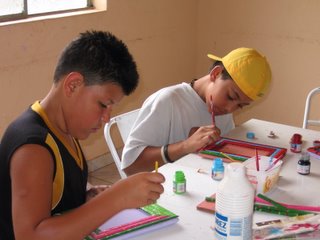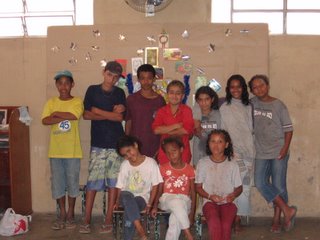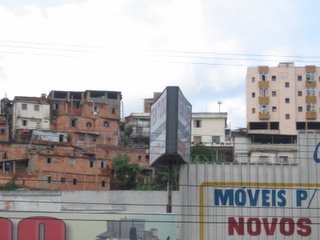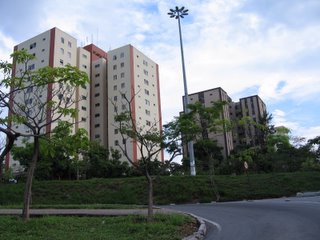Insert your own catchy title here...
I wanted first of all to ask for prayers for my home church, Reconciliation United Methodist in Durham, NC (http://rumcdurham.org). They have just learned that the school in which they've worshipped for eight years has decided not to renew the rental contract, and the church will have to find a new place to worship starting in February 2005.
Here comes the sun
I am very grateful to report that we've finally had a lull in the rain with four mostly sunny days so far. It generally makes such a difference in mood, traffic, etc.
Christmas in Brazil
The two community centers with which I'm volunteering both performed the same musical called "A Little Christmas" about the birth of Jesus from the viewpoint of various groups of insects (bumblebees, spiders, ladybugs, lightning bugs, fleas).
I've heard a few familiar Christmas carols in church, and it seems that the words are not a literal translation. For example, "Silent Night" is called "Night of Peace," and instead of "Silent Night! Holy Night!" you've got "Night of peace! Night of love!" I should have assumed that, but it's still very strange to encounter the different lyrics.
The children at a church I've attended performed their Christmas cantata last Sunday, interspersed with high-tech, pre-filmed video. Their musical was based on the idea if Jesus had been born in Brazil. Two things struck me as cool adaptations--first, Mary & Joseph had to travel throughout the Amazon by river, and second, when they got to Bethlehem, the paper collectors (people who earn money by recyling) took them in. This musical had an indigenous flavor, which seems to be much more acceptable to the Methodist church here (I haven't visited any other denominations yet) than Afro-Brazilian music. It was explained to me that there is a hypersensitivity not to have anything that might appear to be associated with condomblé and the other Afro-Brazilian, polytheistic religions.
Keeping up appearances
It's very interesting to see the social differences here in appearances. It's common to have graffiti on the outside of buildings, but people are constantly sweeping and washing the floors. Also, it's strange to me how obsessed people are with washing their cars--especially now that it is raining all of the time.
This city does not have a lot of grass or open green space, but it does have a lot of trees. And in this place where you see litter all over the place, some people are obsessed with sweeping up leaves and spent flowers, while able to ignore the empty lot across the street strewn with litter. It might be somewhat akin to what I saw in Russia where the public spaces are not very well cared for, but people highly protect and care for their private spaces.
Brazilians love to take showers. It is not uncommon to have and use shower facilities at work. For example, all three of the places where I volunteer have a shower, and at both of the community centers last week, the teachers were showering right before the Christmas cantatas. This would be easier to understand if people had been doing hard labor and perspiring a lot, but I guess they must have the "one drop of sweat" rule. Their stereotype of Americans is that we are dirty (not bathing enough) and so are our cars.
Gift-wrapping is a very big deal here, and most stores provide some type of fancy gift-wrapping for free with your purchase.
I've watched teams at both community centers putting up new displays on the bulletin boards and have marveled at the perfectionism (and I, myself, am Type A).
And it was a whole new ballgame to see the children's costumes for the Christmas cantatas. Who knew that you could sew crepe paper with a sewing machine? I should have expected as much here in the land known for Carnaval and its outlandish costumes.
Anarchy
One of my "supervisors" was asking me what things were the hardest to adjust to here, and when I was describing a couple of things, he came up with a very appropriate word--anarchy. I think all societies have their own unique code of what constitutes rudeness, but here, talking while other people are talking, during free performances, during paid concerts and even during communion seems to be okay (I was surprised when somebody answered their cell phone during communion and had a whole conversation, even though everyone was standing facing each other in a big circle). During a recent concert, I was thinking how offended I would be if I were the artist and noone was really listening to my music, but then I remembered that they were from here and (hopefully) were accustomed to it. To me, this possible lack of attention is an odd counterpoint to all of the flowery pleasantries that one exchanges with any stranger.
I've had more than one "conversation" with strangers now where I said something like "I'm sorry, I'm just learning Portuguese, and I don't understand what you said." and the person kept right on talking.
Pride before the fall
This weekend, it has become clear to me that God is working on diminishing/eliminating my pride. Every so often along my faith journey, some less-than-desirable quality has been brought to the forefront for modification (remember the "you always have to be right!", dear sister?). It's funny how each time my foolish ego can dare to think--"Oh, that was a big fault! But now there are only smaller things left to fix..." :)
In any event, this sojourn in Brazil has definitely been a place to address my pride. Ironically, the book I first read when I got here was Pride and Predjudice. Despite my fierce love of independence, I've had to learn how not only to be somewhat dependent upon people--for example, how to ask for directions when I love to do it "all by myself!". I've always taken pride in my appearance as far as wearing nice (not expensive, trendy or elegant) clothes, but here I have yet to wear the suits or most of the dressier clothes that I brought with me. Moreoever, I am well-aware that most of my blouses, t-shirts, jeans and shorts appear distinctly American, and I am not filled with the same sense of pride I would have while wearing them in the U.S.
One of the biggest things, however, is intellectual pride. I've always prided myself on my intellectual abilities (e.g. my facility with foreign languages), which is a funny thing--to be proud of things you did not earn but were given as a gift. In any event, I have recently been reminded multiple times that I have a pronounced accent and that any Brazilian speaking with me for more than 15 seconds can detect that I am a foreigner. To someone who has always tried to travel under the radar, undetected as an outsider, this is quite a blow. I can generally converse a bit with people who have a facility for languages, are educated or are used to speaking to foreigners, but those that don't/aren't usually do not understand a word I say (or at least vice versa). And in case you were wondering, just like I've seen in the U.S., I have encountered people here who just talk much louder when they realize that you are a foreigner, as though your comprehension were only a matter of volume.
Missionary in training?
I've had more than one conversation with my bosses about the current lack of Methodist missionaries in Brazil and the possibility to become a missionary here, should I be moved in that direction. It's funny how an idea that would have completely repulsed me just a couple of years ago does not sound so far outside the realm of possibility now.
They explained that these first few months here had been more of a "trial period" of sorts to get acclimated and figure out where I can best use my abilities. Hopefully when I return in the New Year (I will be flying home for Christmas and attempting a second time to secure the correct long-term visa, which may involve a waiting period of up to three months) I will be able to contribute more actively, teaching English or music, etc., provided, of course that I really improve my Portuguese over the next several months.
And now, more pictures...
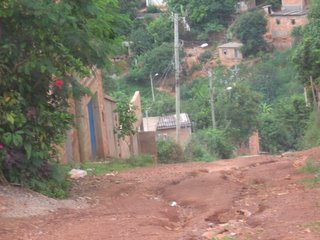
The steep dirt road outside the daycare center in Sabará, in the mountains outside Belo Horizonte
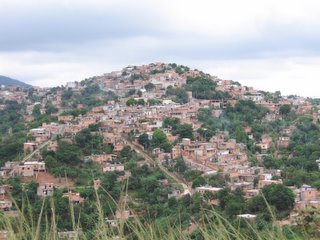
View from Sabará
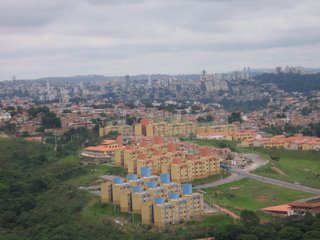 Appearances can be deceiving--this cool-looking housing project on the way to Sabará is apparently an extremely dangerous place after the government relocated numerous squatters there (in order to tear down slums)
Appearances can be deceiving--this cool-looking housing project on the way to Sabará is apparently an extremely dangerous place after the government relocated numerous squatters there (in order to tear down slums)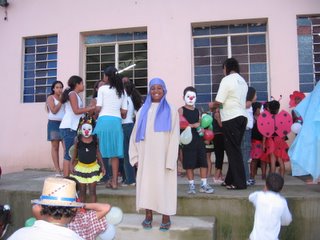
"Backstage" outside the church in Liberdade prior to the Christmas cantata
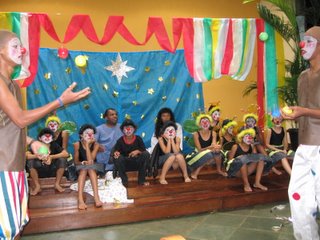
Joseph, Mary, the spiders and the bumblebees look on as the flea circus arrives with the Magi at the Christmas cantata in São Gabriel
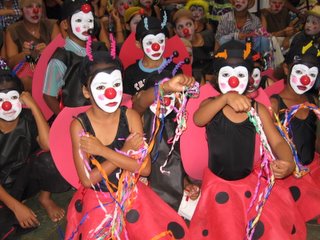 The lady bugs celebrate the birth of Jesus at the São Gabriel Christmas cantata (...if I weren't working on my pride, I might be tempted to mention who was responsible for the white face painting of each ladybug...but since I am, I won't)
The lady bugs celebrate the birth of Jesus at the São Gabriel Christmas cantata (...if I weren't working on my pride, I might be tempted to mention who was responsible for the white face painting of each ladybug...but since I am, I won't)


